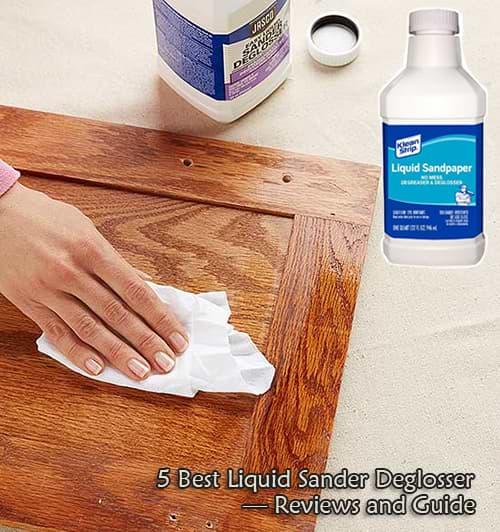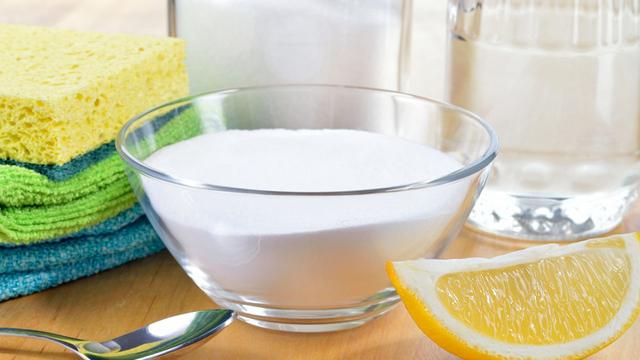The Best Liquid Sander Deglosser for Your Workshop
Photo: depositphotos.com
Those who have tried to resurface a cabinet or old piece of furniture probably remember that roughing up the surface with sandpaper, though critical to good results, is an onerous task. However, liquid sander deglossers make the preparation process much easier. These chemical products strip paint, varnish, and, in some cases, grease and grime from wood and other surfaces. Many of the best sander deglossers are safe for the environment and can do the job with low fumes.
Use this guide to investigate these products, find out which features to consider when shopping, and check out some of the best liquid sander deglossers for your next repainting or refinishing project.
Photo: depositphotos.com
What to Consider When Choosing the Best Liquid Sander Deglosser
While any liquid sander or deglosser can remove paint, the products differ in capabilities. Some can clean dirt and grime while also removing paint, and others also can strip varnish and polyurethane. Keep reading to learn more about these and the other important attributes of the best liquid sander deglosser.
In addition to paint, many liquid sander deglossers also can remove other coatings, including enamel, stain, varnish, and lacquer. A versatile sander deglosser can save money in the long run, as it can be used in multiple applications. While most sander deglossers work with wood, many also suit other materials, including leather, plastic, and ceramic. Check the label of the sander deglosser to determine the types of coatings it can remove and the surfaces it’s suited for.
Any solvent capable of removing paint is generally hazardous to some degree, and some sander deglossers are more toxic than others. Water-based liquid sander deglossers are less toxic and produce fewer VOCs than their oil-based counterparts. Water-based deglossers aren’t flammable, and some are even biodegradable, making them safer for the environment than caustic oil-based varieties.
While water-based sander deglossers are safer to work with, they aren’t harmless. They still contain chemicals that can irritate the skin and burn the eyes. Take the proper safety precautions when working with any sander deglosser. Always wear rubber gloves and eye protection during the process.
Deglossers vary in their ease of application and coverage. Some can be applied in one step: Simply wipe the liquid sander onto the workpiece to remove paint or varnish. This type of deglosser is ideal for smaller pieces, such as a dresser or coffee table, but time-consuming for larger projects like laminate flooring or an entire set of kitchen cabinets.
Deglossers or liquid sanders that can be applied with a paintbrush are better suited for larger projects. These products go on quickly but typically involve multiple steps. Once applied, the liquid sander takes about 30 minutes to work itself into the paint before the user can remove it and the paint with a scraper or rag.
Most liquid sander deglossers come in quart-size bottles (though some larger sizes are available). While coverage varies depending on the amount of paint to be removed, a quart typically can cover about 30 to 40 square feet.
Unlike standard paint strippers, which have high VOCs and produce strong odors (because of their active stripping ingredient, methylene chloride), most liquid sander deglossers don’t have an intense smell. This makes them ideal for working on indoor projects and rooms with poor ventilation. Some sander deglossers use a gel that contains citrus terpenes to remove paint. Both nontoxic and biodegradable, this natural substance also adds a pleasant orange aroma to the deglosser.
Water-based liquid sander deglossers are popular for a number of reasons. Whereas paint stripper may contain caustic chemicals such as methylene chloride as the active ingredient, water-based liquid sander deglossers use less harmful chemicals and, as a result, produce lower VOCs.
Water-based deglossers also work fast. Once applied, the product sets in 30 minutes or less, even when removing an oil-based paint or varnish. Some products work instantly, wiping away the paint or varnish when applied with a rag.
Many sander deglossers use natural chemicals derived from citrus fruits and other plants instead of synthetic chemicals to remove paint, which means they’re biodegradable. Biodegradable deglossers are safer to use and easier on the environment. However, remember that just because the liquid sander deglosser is biodegradable doesn’t mean it’s completely harmless to the environment. Once applied, the deglosser mixes with the paint, varnish, or polyurethane coating that it’s removing to create a solution that’s biodegradable. Dispose of it responsibly.

Tips for Using Liquid Sander Deglosser
While purchasing a quality liquid sander deglosser is key to achieving good results, so too is using the right technique when applying this type of product. Learn how to use a liquid sander deglosser effectively and safely.
Our Top Picks
The products below include some of the best liquid sander deglossers on the market. They are safe, easy to use, produce low fumes, and are friendly to the environment.
1Photo: amazon.com Check Latest PriceWith an ability to clean and lightly rough a wood surface, this deglosser from Heirloom Traditions can prep cabinets, shelves, and furniture for painting or staining. Its brush-on application makes it easier to cover a broad area, such as an entire set of kitchen cabinets, in a relatively short amount of time.
This product works in about 2 minutes, after which the piece will be ready for paint or stain. It’s nonflammable and biodegradable, and it doesn’t produce harsh fumes. It can be used indoors where ventilation is limited. Heirloom Traditions deglosser comes in a 16-ounce bottle, which should be enough coverage for the cabinetry in an 8-by-10-foot kitchen.
2Photo: amazon.com Check Latest PriceGet more for the money with MAX Strip, a budget-friendly product that can strip paint and varnish from laminate, glass, fiberglass, metal, porcelain, wood, various types of masonry, and even carpeting and clothing.
This stripper is one of the safer products available: It contains no toxic chemicals and produces no harsh fumes or odors. Apply it with a brush to cover a lot of ground quickly, let it set for 30 minutes, then use a scraper or cloth to remove the paint.
3Photo: amazon.com Check Latest PricePaint strippers typically emit foul-smelling fumes, making them hazardous or unpleasant to use indoors. This Dumond Chemicals Smart Strip paint remover features an odorless formula suitable for indoor use where ventilation is limited. It’s biodegradable and uses no caustic or toxic chemicals.
Despite its environmentally friendly formula, it’s effective at banishing up to 15 layers of paint and varnish. It works to remove oil- and latex-based paint and varnish from wood, brick, metal, concrete, stone, glass, and other materials. Apply it with a brush and allow it to set; then rinse or wipe it off.
4Photo: amazon.com Check Latest PriceWith an easy-to-use, less toxic formula that’s designed to cut through grime, this liquid sander deglosser from Klean-Strip can remove paint, lacquer, polyurethane, enamel, and varnish.
Apply it in one step: Pour the liquid sander on a clean cloth and apply it in a circular motion, then allow it to dry. Klean-Strip’s strong formula is designed to be tough enough to cut through multiple layers of paint, yet it’s water-based, making it safer to use and easier on the environment than standard paint stripper.
5Photo: amazon.com Check Latest PriceThis cleaner is compatible with various finishes, and it boasts an environmentally friendly formula and easy-to-use application. Klean-Strip GIDDS brands itself as an alternative to TSP, a highly toxic cleaner. It creates no odor and is biodegradable.
This product can clean and rough up enamel, latex, and oil-based paint along with varnish and lacquer. The product also can help get rid of grease, mildew, mold, food stains, crayons, and other substances. Simply wipe it on with a clean cloth and allow it to dry; no rinsing is required.
FAQs About Liquid Sander Deglossers
If wondering which surfaces are compatible with a liquid sander deglosser or how this type of product compares to traditional sanding, keep reading to find the answers to these and other questions about paint remover products.
While some liquid deglossers create an unpleasant odor, many other options on the market do not. In fact, some even emit a pleasant citrus odor because of their natural terpenes content.
Deglossers typically work on paint as well as varnish, enamel, polyurethane, lacquer, and stain.
Yes, liquid deglosser is suitable for laminate surfaces, making it a solid choice to prep a laminate floor for restaining that’s faster than sanding.
To remove stain or paint from a kitchen cabinet, pour the deglosser on a rag and rub the surface in the direction of the wood grain to remove layers of paint and stain.
Pros and cons exist to both processes. Liquid deglosser can save time and energy by roughing up a surface to ready it for paint or stain via a chemical process versus the elbow grease required for sanding. While deglosser quickly removes paint and stain, it can’t smooth uneven surfaces as sanding can. Both methods present safety concerns. Deglosser can produce chemical fumes that can be harmful, while sandpaper turns old paint and stain into sawdust that can be inhaled, which can be especially hazardous if the paint contains lead.
Not necessarily. The deglosser is designed to remove paint and stain and prep the piece for a new finish without the use of sandpaper. However, if the wood is uneven, it typically must be smoothed with sandpaper.







